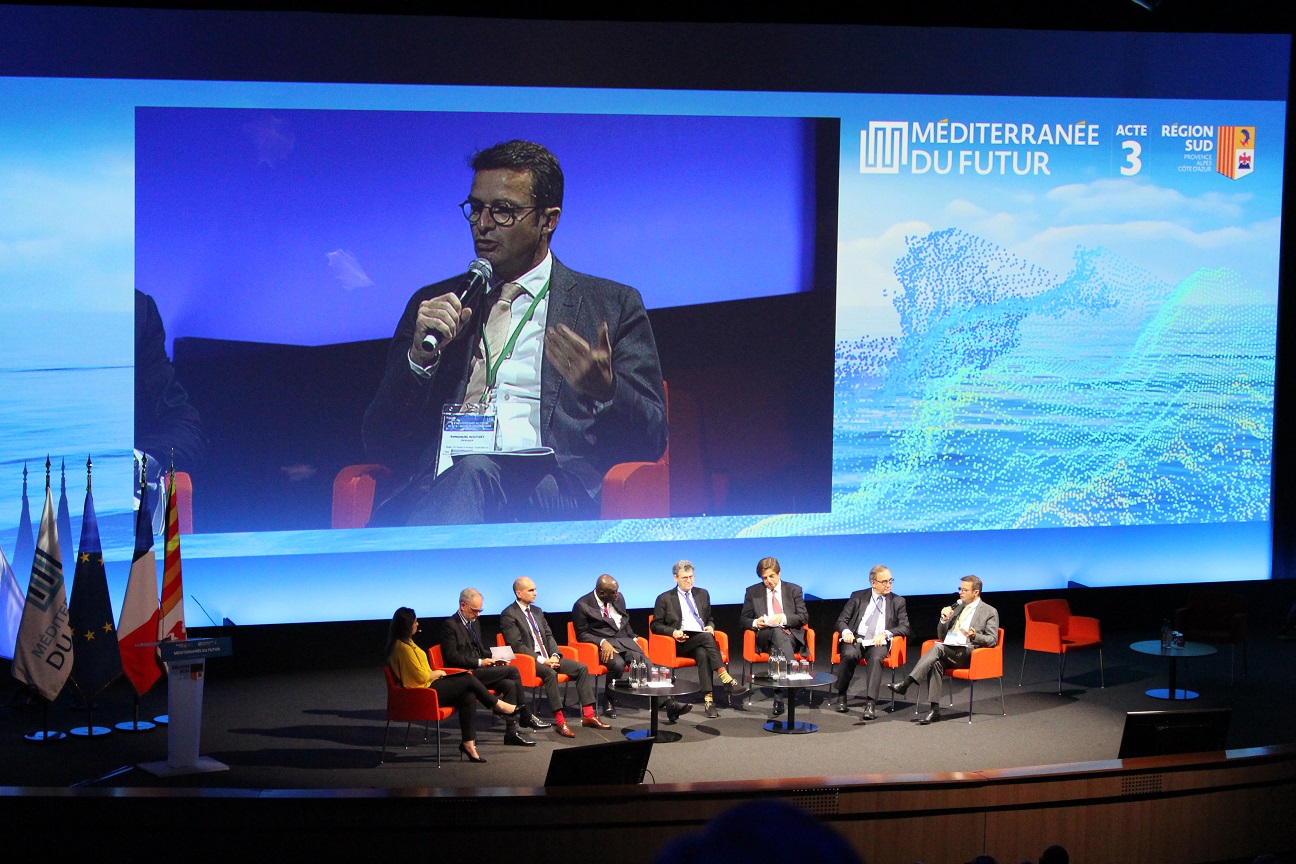NETWORK – ANIMA partner with the Région Sud for the Mediterranée du Futur Act III
Published on 27 November 2019

ANIMA was associated with the Act III of the Conference Mediterranée du Futur held at the Palais du Pharo in Marseille (France) on November 26, 2019.
Organised by the South Region Provence-Alpes-Côte-d’Azur, this high-level conference brought together several thousand public and private stakeholders to launch a new dynamic on the theme of investment in the Mediterranean.
“We are here to promote the link between your region and the new free trade area that has just been created in Africa”
René AWAMBENG, Director of Customer Relations of Afreximbank, the African import-export bank.
Mediterranée du Futur was attended by high-ranking personalities (the President of Région Sud, the General Secretary of Union for the Mediterranean, the French Minister of Foreign Affairs, the CEO of CMA CGM, the President of Afrexim Bank, etc.).
But the ambition of this Act III was also to connect projects and investors. Three pitch spaces were organised in the afternoon: one for innovative companies, one for infrastructure projects and one for cooperation projects.
“Mediterranée du Futur must be the anchor point in France for the Summit of the 2 Rivers initiated by President Macron this year“, said Jean-Yves Le Drian, French Minister of Foreign Affairs.
Answers to future challenges
Emmanuel Noutary, General Delegate of ANIMA, participated in the first round table on “Why invest in the Mediterranean territories” and presented on this occasion the analyses and trends of the attractiveness of the southern Mediterranean in terms of Foreign Direct Investment (FDI):
“The southern Mediterranean attracts 4% of global FDI flows in 2018, which is also their share in the world population. 4 countries out of the 11 studied attract 90% of these investments: Israel, Turkey, Egypt and Morocco. Looking back over the past ten years, these investments have diversified and contribute to sectoral diversification and sustainable development in countries: renewable energy, transport and logistics, agriculture and food, software and electronics, automobile and aeronautics. Unlike ten years ago when FDI was dominated by Europeans, the Mediterranean has now become a crossroads for investors from all over the world. China has joined the top 5 investor countries since 2016. But beyond the volumes, we must above all be attentive to the impacts of these investments. This means identifying projects that are useful for the territories, connecting them with investors, and strengthening the capacity of the territories to support companies towards greater impact.”
The extract from the White Paper distributed at the conference featured two expert articles: “The impact of investment on human and sustainable development” by Nasser Kamel, Secretary General of the Union for the Mediterranean (UfM) and “The Mediterranean must assume its role as an economic space open to the world” by Mihoub Mezouaghi, Director of the Agence Française de Développement (AFD) in Morocco.
These articles responded to a note on trends, opportunities and prospects for FDI in the Mediterranean by Zoé Luçon, Senior Expert at ANIMA. The publication ended with nine “country profiles”, summarising 10 years of foreign investment in the Mediterranean (Algeria, Egypt, Israel, Jordan, Lebanon, Morocco, Palestine, Tunisia and Turkey) in which were presented the evolution of investment flows, the most attractive sectoral portfolios and an analysis of FDI inflows and outflows.
Projects valued by ANIMA
Several entrepreneurs supported by ANIMA’s programs had been selected to present to investors. Among them, we are very pleased that Green Watech, accompanied by the international accelerator DiafrikInvest, received the Mare Nostrum Prize from President Renaud Muselier.
Among the “Territorial Projects / Cooperation in the Mediterranean”, ANIMA was also invited to present its new IMPACT INVEST initiative, designed in partnership with RIAFPI and Business France, and whose ambition is to promote investments for sustainable development in 33 Mediterranean and French-speaking African countries, in partnership with RIAFPI and Business France.
“What is important for the ANIMA network, beyond the amounts invested, is the impact. These issues must be addressed at the continental level because sustainable development knows no borders and investors put countries in competition with each other, explains Aurélien Baudoin, ANIMA’s Director of Development. Impact Invest aims to bring out projects, identify investors for its projects, and provide countries with tools to better assess and support investors towards greater impact.”












